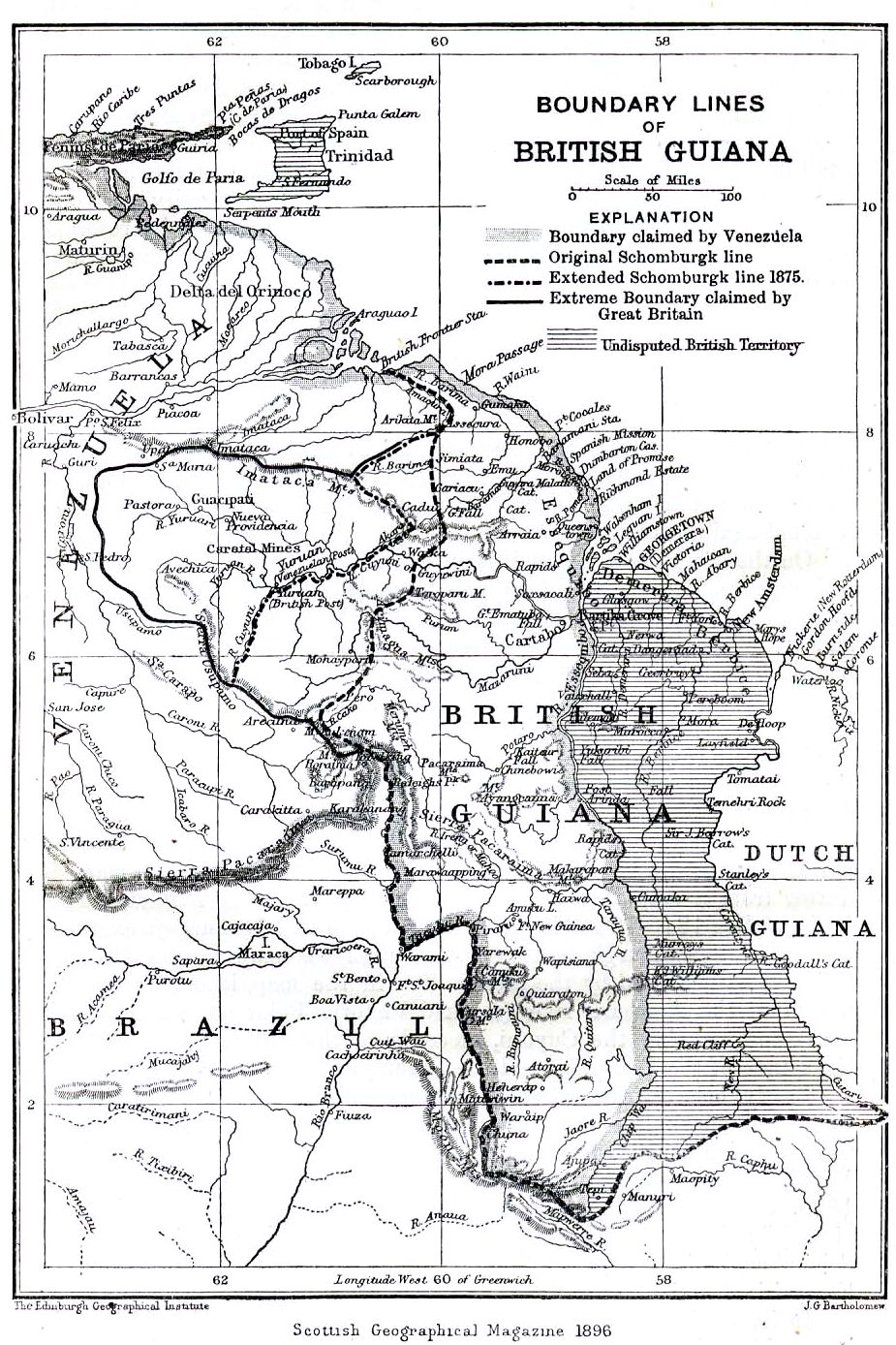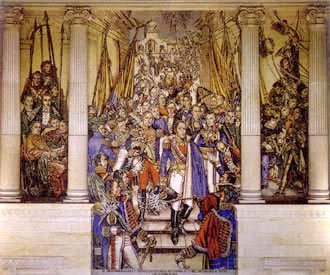|
2023 Venezuelan Referendum
A consultative referendum was initiated by the government of Nicolás Maduro regarding Venezuela's claim over the Guayana Esequiba, whose territory is disputed with, and controlled by, neighboring Guyana. The referendum took place on 3 December 2023 in Venezuela. The population of the territory in question was not consulted and did not vote as voting only took place within Venezuela. The referendum consisted of five questions concerning various aspects of Venezuela's claim to territory controlled and administered by Guyana, including rejection of the International Court of Justice's jurisdiction over the dispute, the establishment of a Guayana Esequiba state, and granting its population immediate Venezuelan citizenship. The referendum was one of the contributing factors for the Guyana–Venezuela crisis. According to the Venezuelan government, more than 95% of Venezuelans who voted selected "yes" on each of the five questions on the ballot. International analysts and media ... [...More Info...] [...Related Items...] OR: [Wikipedia] [Google] [Baidu] |
Majority Vote
A majority, also called a simple majority or absolute majority to distinguish it from related terms, is more than half of the total.Dictionary definitions of ''majority'' aMerriam-Webster Oxford English Dictionary an Cambridge English Dictionary It is a |
2024 Venezuelan Presidential Election
Presidential elections are scheduled to be held in Venezuela in 28 July 2024 to choose a president for a six-year term beginning on 10 January 2025. Leading candidates of the Venezuelan opposition have been disqualified from participating in the election during its campaign or in previous elections. In June 2023, the leading candidate María Corina Machado was barred from participating by the Venezuelan government for alleged political crimes. This move has been regarded by the opposition as violation of political human rights and has been condemned by international bodies like the Organization of American States, the European Union, and Human Rights Watch, as well as countries such as Canada, Chile, Colombia, Ecuador, France, Germany, Mexico, Paraguay, the United Kingdom, the United States and Uruguay. The National Electoral Council (CNE) announced that the election will be held on 28 July (the day that would have been Hugo Chávez's 70th birthday), with filing of candid ... [...More Info...] [...Related Items...] OR: [Wikipedia] [Google] [Baidu] |
Chavismo
''Chavismo'' (from es, chavismo), also known in English as Chavism or Chavezism, is a left-wing political ideology based on the ideas, programs and government style associated with the Venezuelan President between 1999 and 2013 Hugo Chávez that combines elements of democratic socialism, socialist patriotism, Bolivarianism, and Latin American integration. Supporters of Hugo Chávez and ''Chavismo'' are known as ''Chavistas''. Policies Several political parties in Venezuela support ''Chavismo''. The main party, founded by Chávez, is the United Socialist Party of Venezuela ( es, Partido Socialista Unido de Venezuela, links=no), usually referred to by the four letters PSUV). Other parties and movements supporting ''Chavismo'' include Fatherland for All (Spanish: ''Patria Para Todos'' or PPT) and ''Tupamaros''. Broadly, ''Chavismo'' policies include nationalization, social welfare programs and opposition to neoliberalism (particularly the policies of the International Monetary ... [...More Info...] [...Related Items...] OR: [Wikipedia] [Google] [Baidu] |
Venezuelan Crisis Of 1895
The Venezuelan crisis of 1895 occurred over Venezuela's longstanding dispute with the United Kingdom of Great Britain and Ireland about the territory of Essequibo and Guayana Esequiba, which Britain claimed as part of British Guiana and Venezuela saw as Venezuelan territory. As the dispute became a crisis, the key issue became Britain's refusal to include in the proposed international arbitration the territory east of the "Schomburgk Line", which a surveyor had drawn half-a-century earlier as a boundary between Venezuela and the former Dutch territory ceded by the Dutch in the Anglo-Dutch Treaty of 1814, later part of British Guiana.King (2007:249) The crisis ultimately saw Britain accept the United States' intervention in the dispute to force arbitration of the entire disputed territory, and tacitly accept the US right to intervene under the Monroe Doctrine. A tribunal convened in Paris in 1898 to decide the matter, and in 1899 awarded the bulk of the disputed territory to Britis ... [...More Info...] [...Related Items...] OR: [Wikipedia] [Google] [Baidu] |
Grover Cleveland
Stephen Grover Cleveland (March 18, 1837June 24, 1908) was an American lawyer and politician who served as the 22nd and 24th president of the United States from 1885 to 1889 and from 1893 to 1897. Cleveland is the only president in American history to serve two non-consecutive terms in office. He won the popular vote for three presidential elections—in 1884, 1888, and 1892—and was one of two Democrats (followed by Woodrow Wilson in 1912) to be elected president during the era of Republican presidential domination dating from 1861 to 1933. In 1881, Cleveland was elected mayor of Buffalo, and in 1882, he was elected governor of New York. He was the leader of the pro-business Bourbon Democrats who opposed high tariffs, free silver, inflation, imperialism, and subsidies to business, farmers, or veterans. His crusade for political reform and fiscal conservatism made him an icon for American conservatives of the era. Cleveland won praise for his honesty, self-reliance, ... [...More Info...] [...Related Items...] OR: [Wikipedia] [Google] [Baidu] |
United States House Of Representatives
The United States House of Representatives, often referred to as the House of Representatives, the U.S. House, or simply the House, is the Lower house, lower chamber of the United States Congress, with the United States Senate, Senate being the Upper house, upper chamber. Together they comprise the national Bicameralism, bicameral legislature of the United States. The House's composition was established by Article One of the United States Constitution. The House is composed of representatives who, pursuant to the Uniform Congressional District Act, sit in single member List of United States congressional districts, congressional districts allocated to each U.S. state, state on a basis of population as measured by the United States Census, with each district having one representative, provided that each state is entitled to at least one. Since its inception in 1789, all representatives have been directly elected, although universal suffrage did not come to effect until after ... [...More Info...] [...Related Items...] OR: [Wikipedia] [Google] [Baidu] |
Monroe Doctrine
The Monroe Doctrine was a United States foreign policy position that opposed European colonialism in the Western Hemisphere. It held that any intervention in the political affairs of the Americas by foreign powers was a potentially hostile act against the United States. The doctrine was central to American foreign policy for much of the 19th and early 20th centuries. President James Monroe first articulated the doctrine on December 2, 1823, during his seventh annual State of the Union Address to Congress (though it would not be named after him until 1850). At the time, nearly all Spanish colonies in the Americas had either achieved or were close to independence. Monroe asserted that the New World and the Old World were to remain distinctly separate spheres of influence, and thus further efforts by European powers to control or influence sovereign states in the region would be viewed as a threat to U.S. security. In turn, the United States would recognize and not interfere with ... [...More Info...] [...Related Items...] OR: [Wikipedia] [Google] [Baidu] |
Yuruarí River
Yuruarí River is a river of Venezuela. It is part of the Essequibo River basin. See also *List of rivers of Venezuela This is a list of rivers in Venezuela. By drainage basin This list is arranged by drainage basin, with respective tributaries indented under each larger stream's name. Atlantic Ocean Amazon Basin * ''Amazon River'' (Brazil) ** Rio Negro *** Cas ... References *Rand McNally, The New International Atlas, 1993. Rivers of Venezuela Geography of Bolívar (state) {{Venezuela-river-stub ... [...More Info...] [...Related Items...] OR: [Wikipedia] [Google] [Baidu] |
José Antonio Páez
José Antonio Páez Herrera (; 13 June 1790 – 6 May 1873) was a Venezuelan leader who fought against the Spanish Crown for Simón Bolívar during the Venezuelan War of Independence. He later led Venezuela's independence from Gran Colombia. He dominated the country's politics for most of the next two decades once the country had achieved independence from Gran Colombia, serving either as president of Venezuela (1830–1835; 1839–1843; 1861–1863) or as the power behind puppet presidents. He is considered a prime example of a 19th-century South American caudillo, and imbued the country with a legacy of authoritarian rule that lasted, with few exceptions, until 1958. He lived in Buenos Aires and New York City during his years in exile and died in the latter in 1873. Biography Early life Páez was born in Curpa (now part of Acarigua), Portuguesa State in the Captaincy General of Venezuelapart of the Spanish Empire. His paternal grandmother, Luisa Antonia de Mendoza y Mota, ... [...More Info...] [...Related Items...] OR: [Wikipedia] [Google] [Baidu] |
Schomburgk Line
(), sometimes also called or Essequibo, is a disputed territory of west of the Essequibo River that is administered and controlled by Guyana but claimed by Venezuela.''British Guiana Boundary: Arbitration with the United States of Venezuela. The Case (and Appendix) on Behalf of the Government of Her Britannic Majesty'' Volume 7. Printed at the Foreign office, by Harrison and sons, 1898. The boundary dispute was inherited from the colonial powers ( in the case of Venezuela, and |
Robert Hermann Schomburgk
Sir Robert Hermann Schomburgk (5 June 1804 – 11 March 1865) was a German-born explorer for Great Britain who carried out geographical, ethnological and botanical studies in South America and the West Indies, and also fulfilled diplomatic missions for Great Britain in the Dominican Republic and Thailand. Life and career Schomburgk was born at Freyburg, Prussian Saxony, the son of a Protestant minister. In 1820, while staying with his uncle, he learned botany from a professor. Commercial career He entered commercial life and, in 1828, went to the United States, where he worked for a time as a clerk in Boston and Philadelphia. In 1828, he was requested to supervise a transport of Saxon sheep to the American state of Virginia, where he lived for a time. The same year, he became a partner in a tobacco manufactory at Richmond. The factory was burned, and Schomburgk was ruined. He suffered further setbacks on the Caribbean island of St. Thomas, where he lost all his belongings in a ... [...More Info...] [...Related Items...] OR: [Wikipedia] [Google] [Baidu] |
Gran Colombia
Gran Colombia (, "Great Colombia"), or Greater Colombia, officially the Republic of Colombia (Spanish: ''República de Colombia''), was a state that encompassed much of northern South America and part of southern Central America from 1819 to 1831. It included present-day Colombia, mainland Ecuador (i.e. excluding the Galápagos Islands), Panama, and Venezuela, along with parts of northern Peru, northwestern Brazil, and Part of Guyana. The terms Gran Colombia and Greater Colombia are used historiographically to distinguish it from the current Republic of Colombia, which is also the official name of the former state. However, international recognition of the legitimacy of the Gran Colombian state ran afoul of European opposition to the independence of states in the Americas. Austria, France, and Russia only recognized independence in the Americas if the new states accepted monarchs from European dynasties. In addition, Colombia and the international powers disagreed over the exte ... [...More Info...] [...Related Items...] OR: [Wikipedia] [Google] [Baidu] |
.png)





